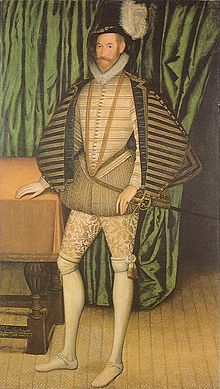Jerome Bowes
| Sir Jerome Bowes | |
|---|---|
 |
|
| English Ambassador to Russia | |
|
In office 1583–1584 |
|
| Member of Parliament for Lancaster | |
|
In office 1601–1601 |
|
| Member of Parliament for Reading | |
|
In office 1604–1604 |
Sir Jerome Bowes (died 1616) was an English ambassador to Russia and Member of Parliament in England.
He was born into a Durham family, the son of John Bowes, and his wife Ann, née Gunville, whose family were from Gorleston, then in Suffolk. His name is included in the list of the gentlemen who followed Edward Clinton, to France, on his expedition to avenge the fall of Calais. It has been inferred from a casual mention of him by John Stowe that he was a client of Robert Dudley, 1st Earl of Leicester in 1571, but he was banished from court six years later for slanderous speech against him.
Bowes was restored to favour, and in 1583 was appointed ambassador to Russia. Fedor Pisemsky had travelled to England in 1581, and the diplomatic background included trade matters, and a proposed marriage of Ivan IV of Russia to Lady Mary Hastings, daughter of Francis Hastings, 2nd Earl of Huntingdon. In June 1583 Bowes set sail with Pisemsky for Russia, on what turned out to be a fruitless mission.John Milton, in his Brief History of Moscovia, gives an account of this embassy, taken from Richard Hakluyt. There are some additional anecdotes recorded in Samuel Pepys's Diary, told to him by a group of customs officers in 1662, eighty years after the event, and in Samuel Collins's Present State of Russia (1671).
In Collins' account Ivan IV of Russia is said to have nailed the French ambassador's hat to his head. Bowes at his next audience put on his hat, and the tsar threatened him with the like punishment. Bowes replied that he did not represent the cowardly king of France, but the invincible queen of England, "who does not vail her bonnet nor bare her head to any prince living". The tsar commended his bravery and took him into favour. Bowes is also said to have tamed a wild horse so effectually that the animal fell dead under him. Milton describes the pomp of the reception and how the ambassador refused submit to etiquette and put the letters into the hands of the chancellor, insisting upon his right to give them to the emperor himself. The tsar, irritated by the assertion of Elizabeth's equality with the French and Spanish kings, lost patience when Bowes, to his question "what of the emperor?" replied that her father, Henry VIII, had the Holy Roman Emperor in his pay. Ivan hinted that Bowes might be thrown out of the window, to which Bowes replied that the queen would know how to revenge any injury done to her ambassador. Ivan's anger gave place to admiration, and he again raised the possibility of a marriage to one of the queen's relatives. But he died soon after, and with his successor, Feodor I, the anti-English Dutch faction came into power.
...
Wikipedia
